formerly eScholarship Editions


|
|
|
|
Your search for
'Technology and Society' in subject
found 31 book(s). | Modify Search | Displaying 1 - 20 of 31 book(s) | |
| 1. | 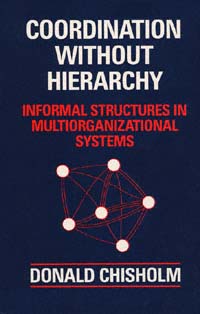 | Title: Coordination without hierarchy: informal structures in multiorganizational systems Author: Chisholm, Donald William Published: University of California Press, 1992 Subjects: Politics | Technology and Society Publisher's Description: The organizational history of American government during the past 100 years has been written principally in terms of the creation of larger and larger public organizations. Beginning with the Progressive movement, no matter the goal, the reflexive response has been to consolidate and centralize into formal hierarchies. That efficiency, effectiveness, and accountability, and the coordination necessary to achieve them, are promoted by such reorganizations has become widely accepted.Borrowing from social psychology, sociology, political science, and public administration, and using the public transit system of the San Francisco Bay area for illustrative purposes, Donald Chisholm directly challenges this received wisdom. He argues that, contrary to contemporary canons of public administration, we should actively resist the temptation to consolidate and centralize our public organizations. Rather, we should carefully match organizational design with observed types and levels of interdependence, since organizational systems that on the surface appear to be tightly linked webs of interdependence on closer examination often prove decomposable into relatively simpler subsystems that may be coordinated through decentralized, informal organizational arrangements.Chisholm finds that informal channels between actors at different organizations prove remarkably effective and durable as instruments of coordination. Developed and maintained as needed rather than according to a single preconceived design, informal channels, along with informal conventions and contracts, tend to match interorganization interdependence closely and to facilitate coordination. Relying on such measures reduces the cognitive demands and obviates the necessity for broadscale political agreement typical of coordination by centralized, formal organizations. They also advance other important values that are frequently absent in formally consolidated organizations, such as reliability, flexibility, and the representation of varied interests. Coordination Without Hierarchy is an incisive, penetrating work whose conclusions apply to a wide range of public organizations at all levels of government. It will be of interest to a broad array of social scientists and policymakers.In an earlier version, Coordination Without Hierarchy received the American Political Science Association 1985 Leonard D. White Award for the best doctoral dissertation in the field of public administration, including broadly related problems of policy formation and administrative theory. [brief] Similar Items |
| 2. | 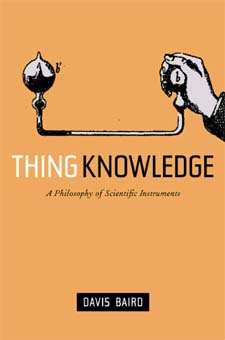 | Title: Thing knowledge: a philosophy of scientific instruments Author: Baird, Davis Published: University of California Press, 2004 Subjects: Philosophy | Technology and Society Publisher's Description: Western philosophers have traditionally concentrated on theory as the means for expressing knowledge about a variety of phenomena. This absorbing book challenges this fundamental notion by showing how objects themselves, specifically scientific instruments, can express knowledge. As he considers numerous intriguing examples, Davis Baird gives us the tools to "read" the material products of science and technology and to understand their place in culture. Making a provocative and original challenge to our conception of knowledge itself, Thing Knowledge demands that we take a new look at theories of science and technology, knowledge, progress, and change. Baird considers a wide range of instruments, including Faraday's first electric motor, eighteenth-century mechanical models of the solar system, the cyclotron, various instruments developed by analytical chemists between 1930 and 1960, spectrometers, and more. [brief] Similar Items |
| 3. | 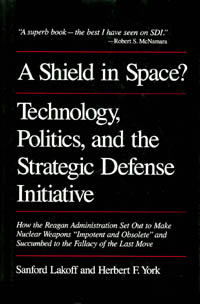 | Title: A shield in space?: technology, politics, and the strategic defense initiative: how the Reagan Administration set out to make nuclear weapons "impotent and obsolete" and succumbed to the fallacy of the last move Author: Lakoff, Sanford A Published: University of California Press, 1989 Subjects: Politics | Political Theory | Technology and Society Publisher's Description: In March 1983, Ronald Reagan made one of the most controversial announcements of his presidency when he called on the nation's scientists and engineers to develop a defensive shield so impenetrable as to make nuclear weapons "impotent and obsolete." This book provides the first comprehensive review and evaluation of the project launched to implement that announcement - the project officially known as the Strategic Defense Initiative and more popularly as "Star Wars." The authors - a political scientist and a physicist who has played a key role in developing military technologies - provide an intriguing account of how political rather than technical judgment led to the initial decision, and they explain the technical issues in terms accessible to nonspecialists. Judging SDI as "a classic example of misplaced faith in the promise of technological salvation," the authors examine the implications of the program for strategy, arms control, the unity of the Western alliance, its prospective economic impact, and the way the American political process has dealt with all these issues. [brief] Similar Items |
| 4. | 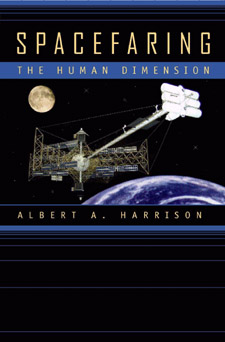 | Title: Spacefaring: the human dimension Author: Harrison, Albert A Published: University of California Press, 2001 Subjects: Science | Technology and Society | Psychology Publisher's Description: The stars have always called us, but only for the past forty years or so have we been able to respond by traveling in space. This book explores the human side of spaceflight: why people are willing to brave danger and hardship to go into space; how human culture has shaped past and present missions; and the effects of space travel on health and well-being. A comprehensive and authoritative treatment of its subject, this book combines statistical studies, rich case histories, and gripping anecdotal detail as it investigates the phenomenon of humans in space - from the earliest spaceflights to the missions of tomorrow. Drawing from a strong research base in the behavioral sciences, Harrison covers such topics as habitability, crew selection and training, coping with stress, group dynamics, accidents, and more. In addition to taking a close look at spacefarers themselves, Spacefaring reviews the broad organizational and political contexts that shape human progress toward the heavens. With the ongoing construction of the International Space Station, the human journey to the stars continues, and this book will surely help guide the way. [brief] Similar Items |
| 5. | 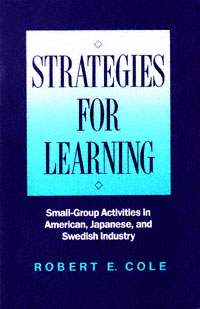 | Title: Strategies for learning: small-group activities in American, Japanese, and Swedish industry Author: Cole, Robert E Published: University of California Press, 1991 Subjects: Sociology | Technology and Society | Japan | Economics and Business Publisher's Description: How do firms become motivated to adopt small-group activities such as quality circles and self-managing teams? How do they acquire expertise in these activities? Noted sociologist and management expert Robert E. Cole addresses these issues through an examination of small-group activities in the Unit . . . [more] Similar Items |
| 6. | 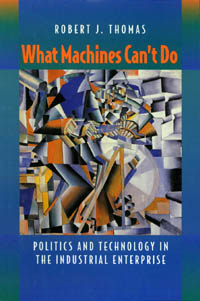 | Title: What machines can't do: politics and technology in the industrial enterprise Author: Thomas, Robert Joseph 1952- Published: University of California Press, 1994 Subjects: Economics and Business | Politics | Sociology | Technology and Society Publisher's Description: Virtually every manufacturing company has plans for an automated "factory of the future." But Robert J. Thomas argues that smart machines may not hold the key to an industrial renaissance. In this provocative and enlightening book, he takes us inside four successful manufacturing enterprises to reveal the social and political dynamics that are an integral part of new production technology. His interviews with nearly 300 individuals, from top corporate executives to engineers to workers and union representatives, give his study particular credibility and offer surprising insights into the organizational power struggles that determine the form and performance of new technologies.Thomas urges managers not to put blind hopes into smarter machines but to find smarter ways to organize people. As U.S. companies battle for survival in an era of growing global competition, What Machines Can't Do is an invaluable treatise on the ways we organize work. While its call for change is likely to be controversial, it will also attract anyone who wishes to understand the full impact of new technology on jobs, organizations, and the future of the industrial enterprise. [brief] Similar Items |
| 7. | 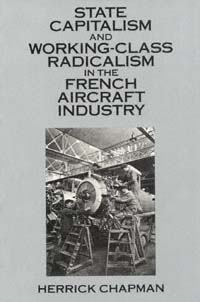 | Title: State capitalism and working-class radicalism in the French aircraft industry Author: Chapman, Herrick Published: University of California Press, 1990 Subjects: History | European History | Politics | Technology and Society | French Studies Publisher's Description: In the 1950s and 1960s France experienced an economic miracle. As the state's role expanded with efforts to create a more modern economy, however, labor relations remained more volatile and workers more radical than elsewhere in western Europe. Herrick Chapman argues in this important new book that state capitalism and working-class radicalism went hand-in-hand and that both have antecedents in the tumultuous events of the 1930s and 1940s.The author focuses on a key industry - aviation - which held center stage in France from the Great Depression to the Cold War. While manufacturers and state officials struggled to modernize, the aviation industry became a bastion of the Communist Party and an arena of combat where workers, employers, and officials promoted competing visions of industrial reform. This gave rise to a new environment where state intervention and working-class radicalism became mutually reinforcing, and by the postwar era a peculiarly contentious form of industrial politics had become firmly entrenched.Using local and national archives, the author analyzes not only how an industry transformed but also how people reacted to the Popular Front, the defeat of 1940, the Nazi Occupation, and the onset of the Cold War. He also sheds light on such central themes in modern French history as the style of entrepreneurship, the sources of state interventionism, the response of workers to technological change and the nature of the Communist movement. [brief] Similar Items |
| 8. | 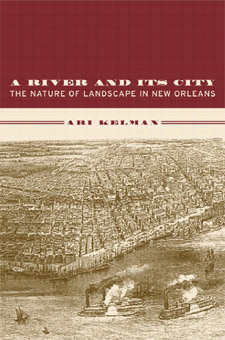 | Title: A river and its city: the nature of landscape in New Orleans Author: Kelman, Ari 1968- Published: University of California Press, 2003 Subjects: History | United States History | Environmental Studies | Technology and Society Publisher's Description: This engaging environmental history explores the rise, fall, and rebirth of one of the nation's most important urban public landscapes, and more significantly, the role public spaces play in shaping people's relationships with the natural world. Ari Kelman focuses on the battles fought over New Orleans's waterfront, examining the link between a river and its city and tracking the conflict between public and private control of the river. He describes the impact of floods, disease, and changing technologies on New Orleans's interactions with the Mississippi. Considering how the city grew distant - culturally and spatially - from the river, this book argues that urban areas provide a rich source for understanding people's connections with nature, and in turn, nature's impact on human history. [brief] Similar Items |
| 9. |  | Title: Assembled in Japan: electrical goods and the making of the Japanese consumer Author: Partner, Simon Published: University of California Press, 2000 Subjects: History | Japan | Media Studies | Technology and Society | Consumerism Publisher's Description: Assembled in Japan investigates one of the great success stories of the twentieth century: the rise of the Japanese electronics industry. Contrary to mainstream interpretation, Simon Partner discovers that behind the meteoric rise of Sony, Matsushita, Toshiba, and other electrical goods companies was neither the iron hand of Japan's Ministry of International Trade and Industry nor a government-sponsored export-led growth policy, but rather an explosion of domestic consumer demand that began in the 1950s.This powerful consumer boom differed fundamentally from the one under way at the same time in the United States in that it began from widespread poverty and comparatively miserable living conditions. Beginning with a discussion of the prewar origins of the consumer engine that was to take off under the American Occupation, Partner quickly turns his sights on the business leaders, inventors, laborers, and ordinary citizens who participated in the broadly successful effort to create new markets for expensive, unfamiliar new products.Throughout, the author relates these pressure-cooker years in Japan to the key themes of twentieth-century experience worldwide: the role of technology in promoting social change, the rise of mass consumer societies, and the construction of gender in advanced industrial economies. [brief] Similar Items |
| 10. |  | Title: Managing in the corporate interest: control and resistance in an American bank Author: Smith, Vicki 1951- Published: University of California Press, 1990 Subjects: Sociology | Technology and Society | Economics and Business | Politics Similar Items |
| 11. | 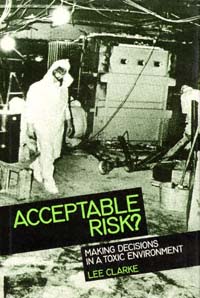 | Title: Acceptable risk?: making decisions in a toxic environment Author: Clarke, Lee Ben Published: University of California Press, 1989 Subjects: Sociology | Technology and Society | Environmental Studies | Public Policy Publisher's Description: Organizations and modern technology give us much of what we value, but they have also given us Chernobyl, Three Mile Island, and Bhopal. The question at the heart of this paradox is "What is acceptable risk?" Based on his examination of the 1981 contamination of an office building in Binghamton, New York, Lee Clarke's compelling study argues that organizational processes are the key to understanding how some risks rather than others are defined as acceptable. He finds a pattern of decision-making based on relationships among organizations rather than the authority of individuals or single agencies. [brief] Similar Items |
| 12. | 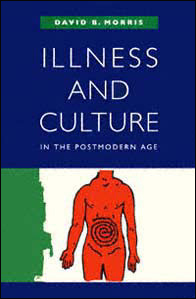 | Title: Illness and culture in the postmodern age Author: Morris, David B Published: University of California Press, 1998 Subjects: Sociology | Philosophy | Medicine | Technology and Society | Anthropology | American Studies Publisher's Description: We become ill in ways our parents and grandparents did not, with diseases unheard of and treatments undreamed of by them. Illness has changed in the postmodern era - roughly the period since World War II - as dramatically as technology, transportation, and the texture of everyday life. Exploring these changes, David B. Morris tells the fascinating story, or stories, of what goes into making the postmodern experience of illness different, perhaps unique. Even as he decries the overuse and misuse of the term "postmodern," Morris shows how brightly ideas of illness, health, and postmodernism illuminate one another in late-twentieth-century culture.Modern medicine traditionally separates disease - an objectively verified disorder - from illness - a patient's subjective experience. Postmodern medicine, Morris says, can make no such clean distinction; instead, it demands a biocultural model, situating illness at the crossroads of biology and culture. Maladies such as chronic fatigue syndrome and post-traumatic stress disorder signal our awareness that there are biocultural ways of being sick.The biocultural vision of illness not only blurs old boundaries but also offers a new and infinitely promising arena for investigating both biology and culture. In many ways Illness and Culture in the Postmodern Age leads us to understand our experience of the world differently. [brief] Similar Items |
| 13. |  | Title: Secure from rash assault: sustaining the Victorian environment Author: Winter, James H 1925- Published: University of California Press, 1999 Subjects: History | Victorian History | Ecology | Geography | Technology and Society Publisher's Description: Nineteenth-century Britain led the world in technological innovation and urbanization, and unprecedented population growth contributed as well to the "rash assault," to quote Wordsworth, on Victorian countrysides. Yet James Winter finds that the British environment was generally spared widespread ecological damage.Drawing from a remarkable variety of sources and disciplines, Winter focuses on human intervention as it not only destroyed but also preserved the physical environment. Industrial blight could be contained, he says, because of Britain's capacity to import resources from elsewhere, the conservative effect of the estate system, and certain intrinsic limitations of steam engines. The rash assault was further blunted by traditional agricultural practices, preservation of forests, and a growing recreation industry that favored beloved landscapes. Winter's illumination of Victorian attitudes toward the exploitation of natural resources offers a valuable preamble to ongoing discussions of human intervention in the environment. [brief] Similar Items |
| 14. |  | Title: For love of the automobile: looking back into the history of our desires Author: Sachs, Wolfgang Published: University of California Press, 1992 Subjects: Science | European History | Technology and Society | German Studies Publisher's Description: In his cultural analysis of the motor car in Germany, Wolfgang Sachs starts from the assumption that the automobile is more than a means of transportation and that its history cannot be understood merely as a triumphant march of technological innovation. Instead, Sachs examines the history of the automobile from the late 1880s until today for evidence on the nature of dreams and desires embedded in modern culture. Written in a lively style and illustrated by a wealth of cartoons, advertisements, newspaper stories, and propaganda, this book explores the nature of Germany's love affair with the automobile. A "history of our desires" for speed, wealth, violence, glamour, progress, and power - as refracted through images of the automobile - it is at once fascinating and provocative.Sachs recounts the development of the automobile industry and the impact on German society of the marketing and promotion of the motor car. As cars became more affordable and more common after World War II, advertisers fanned the competition for status, refining their techniques as ownership became ever more widespread.Sachs concludes by demonstrating that the triumphal procession of private motorization has in fact become an intrusion. The grand dreams once attached to the automobile have aged. Sachs appeals for the cultivation of new dreams born of the futility of the old ones, dreams of "a society liberated from progress," in which location, distance, and speed are reconceived in more appropriately humane dimensions. [brief] Similar Items |
| 15. |  | Title: Technology as freedom: the New Deal and the electrical modernization of the American home Author: Tobey, Ronald C Published: University of California Press, 1997 Subjects: History | American Studies | Technology and Society | United States History Publisher's Description: Before 1930, the domestic market for electrical appliances was segmented, but New Deal policies and programs created a true mass market, reshaping the electrical and housing markets and guiding them toward mandated social goals. The New Deal identified electrical refrigeration as a key technology to reform domestic labor, raise family health, and build family assets. New Deal incentives led to nearly fifty percent of Title I National Housing Act loans being used to buy electric refrigerators in the 1930s. New Deal policies ultimately created the mass commodity culture of home-owning families that typified the conservative 1950s. [brief] Similar Items |
| 16. |  | Title: No safe place: toxic waste, leukemia, and community action Author: Brown, Phil Published: University of California Press, 1997 Subjects: Sociology | American Studies | Ecology | Medicine | Technology and Society Publisher's Description: Toxic waste, contaminated water, cancer clusters - these phrases suggest deception and irresponsibility. But more significantly, they are watchwords for a growing struggle between communities, corporations, and government. In No Safe Place , sociologists, public policy professionals, and activists will learn how residents of Woburn, Massachusetts discovered a childhood leukemia cluster and eventually sued two corporate giants. Their story gives rise to questions important to any concerned citizen: What kind of government regulatory action can control pollution? Just how effective can the recent upsurge of popular participation in science and technology be? Phil Brown, a medical sociologist, and Edwin Mikkelsen, psychiatric consultant to the plaintiffs, look at the Woburn experience in light of similar cases, such as Love Canal, in order to show that toxic waste contamination reveals fundamental flaws in the corporate, governmental, and scientific spheres.The authors strike a humane, constructive note amidst chilling odds, advocating extensive lay involvement based on the Woburn model of civic action. Finally, they propose a safe policy for toxic wastes and governmental/corporate responsibility. Woburn, the authors predict, will become a code word for environmental struggles. [brief] Similar Items |
| 17. | 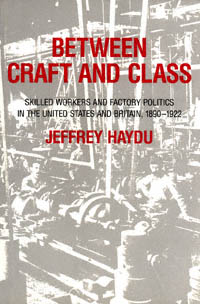 | Title: Between craft and class: skilled workers and factory politics in the United States and Britain, 1890-1922 Author: Haydu, Jeffrey Published: University of California Press, 1991 Subjects: Sociology | United States History | European History | Labor Studies | Technology and Society Publisher's Description: Between Craft and Class provides an incisive new look at workers' responses to the momentous economic changes surrounding them in the early years of the twentieth century. In this work, Haydu focuses on the reaction of skilled metal workers to new production methods that threatened time-honored craft traditions. He finds that the workers' responses to industrial change varied - some defended the status quo, while others agreed to trade customary rules for economic rewards. Under some conditions class protest arose, as workers of diverse skills and trades joined to demand a greater voice in the management of industry. Between Craft and Class explores how broadly based movements for workers' control developed during this critical period, and why they ultimately failed.Comparing workers in the United States and Britain, Haydu's scholarship is distinguished by extensive primary source research and provocative theoretical insights. In its scope and depth, this book will revise current notions of craft politics and working-class radicalism during this period. [brief] Similar Items |
| 18. | 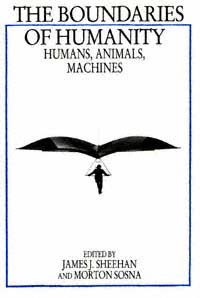 | Title: The Boundaries of humanity: humans, animals, machines Author: Sheehan, James J Published: University of California Press, 1991 Subjects: Philosophy | History and Philosophy of Science | Biology | Technology and Society Publisher's Description: To the age-old debate over what it means to be human, the relatively new fields of sociobiology and artificial intelligence bring new, if not necessarily compatible, insights. What have these two fields in common? Have they affected the way we define humanity? These and other timely questions are addressed with colorful individuality by the authors of The Boundaries of Humanity .Leading researchers in both sociobiology and artificial intelligence combine their reflections with those of philosophers, historians, and social scientists, while the editors explore the historical and contemporary contexts of the debate in their introductions. The implications of their individual arguments, and the often heated controversies generated by biological determinism or by mechanical models of mind, go to the heart of contemporary scientific, philosophical, and humanistic studies. [brief] Similar Items |
| 19. | 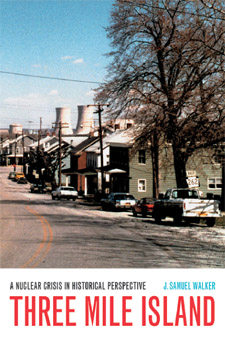 | Title: Three Mile Island: a nuclear crisis in historical perspective Author: Walker, J. Samuel Published: University of California Press, 2004 Subjects: History | Technology and Instruments | Environment | Technology and Society | United States History Publisher's Description: Twenty-five years ago, Hollywood released The China Syndrome, featuring Jane Fonda and Michael Douglas as a TVnews crew who witness what appears to be a serious accident at a nuclear power plant. In a spectacular coincidence, on March 28, 1979, less than two weeks after the movie came out, the worst accident in the history of commercial nuclear power in the United States occurred at Three Mile Island. For five days, the citizens of central Pennsylvania and the entire world, amid growing alarm, followed the efforts of authorities to prevent the crippled plant from spewing dangerous quantities of radiation into the environment. This book is the first comprehensive account of the causes, context, and consequences of the Three Mile Island crisis. In gripping prose, J. Samuel Walker captures the high human drama surrounding the accident, sets it in the context of the heated debate over nuclear power in the seventies, and analyzes the social, technical, and political issues it raised. His superb account of those frightening and confusing days will clear up misconceptions held to this day about Three Mile Island. The heart of Walker's suspenseful narrative is a moment-by-moment account of the accident itself, in which he brings to life the players who dealt with the emergency: the Nuclear Regulatory Commission, the state of Pennsylvania, the White House, and a cast of scientists and reporters. He also looks at the aftermath of the accident on the surrounding area, including studies of its long-term health effects on the population, providing a fascinating window onto the politics of nuclear power and an authoritative account of a critical event in recent American history. [brief] Similar Items |
| 20. | 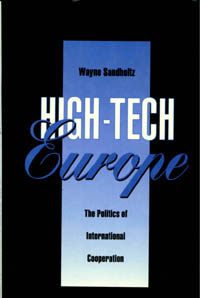 | Title: High-Tech Europe: the politics of international cooperation Author: Sandholtz, Wayne Published: University of California Press, 1992 Subjects: Politics | Public Policy | Economics and Business | Technology and Society Publisher's Description: A study of cooperative efforts in the high-tech industries of Europe. Sandholtz examines why collaboration came late to these countries, how protective walls came down, how countries work together in economically sensitive areas.Governments have recognized for decades the dynamic role played by microelectronics, computers, and telecommunications in the modern economy. Although Europe's deficiencies in these crucial sectors had long been acknowledged, it was not until the 1980s that European nations began collaborating to develop and promote high-tech industries. Their collaboration gives rise to many questions. Why, for example, did the joint efforts come at such a late date rather than in the 1960s or 70s? And how is it possible that they work together in economically sensitive areas? These questions point to fundamental issues in the areas of international cooperation, international institutions, and technology policy.Before the institution of the collaborative programs ESPRIT (European Strategic Programme for Research and Development in Information Technology), RACE (R & D in Advanced Communications-technologies in Europe), and EUREKA (European Research Coordination Agency) in the 1980s, each European country sought its own technological renaissance through protection of national firms behind walls of technical standards, procurement preferences, and research subsidies. Here is a thorough, carefully researched work that examines the breakdown of these walls. It will appeal to political scientists, economists, and scholars of technology and Western Europe interested in the political contours of the high-tech landscape. [brief] Similar Items |